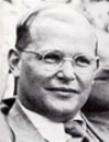Heroes of the Faith
Concise stories of significant Christian leaders
Concise stories of significant Christian leaders
© Peter J. Blackburn 1999
Heroes of the Faith
Heroes of the Faith

 Dietrich Bonhoeffer
Dietrich Bonhoeffer1906-
———————————————————————
Dietrich Bonhoeffer was born in 1906. His father was a noted neurologist. He studied at both Tübingen and Berlin, receiving a doctorate in theology at the University of Berlin, and taught at Berlin for several years.
A student pastorate in Barcelona (1928-29), study in the United States (1930-31), and attendance at the Cambridge conference of the World Alliance for Promoting International Friendship Through the Churches (1931) awakened him to a wider world of faith. Names the latter's Youth Secretary for Germany and Central Europe, he plunged wholeheartedly into ecumenism. He insisted that the movement most seek to understand what the church is and to speak about matters of doctrine and heresy where the church had betrayed Christ, such as the treatment of Jews and the false church government in Germany. It should not be a council of theologians but as assembly of the church of Christ witnessing to the world. Although he resigned his youth post in 1937, he deepened his ecumenical ties even as he became implicated in the conspiracy against Hitler.
Bonhoeffer's role in the resistance to Nazism flowed from his understanding of the church, which for him was a unity in Christ, a divine community composed of people who are simultaneously sinful and holy, judged and forgiven, and its authority rests on the Word of God. His concept of the church as unity underlay his commitment to ecumenism, whereas the church as the presence of God in the world was the reason it must exercise political responsibility. To be sure, the church would sin when it entered politics, but is lived by forgiveness.
From 1933, Bonhoeffer criticised the abuses of the Hitler regime. He categorically rejected the "Aryan clauses", which provided for removing those of Jewish descent from public office. In April he declared that the church may criticise an unjust action of the state, assist the victims of this injustice, and even "take direct political action" if it is convinced that the state has failed in its duty to keep law and order. He belonged to the group opposing the takeover of the Protestant church by the proªNazi "German Christians," helped write the Bethel Confession (a forerunner of the Barmen Declaration of May 1934), and joined Martin Niemöller's Pastors' Emergency League.
After a brief pastorate in London (1933-35), Bonhoeffer returned to Germany in April 1935. Since the Nazis now controlled the theological faculties, the Confessing Church opened some alternative schools known as preachers' seminaries. Bonhoeffer directed one situated in the remote Pomeranian village of Finkenwalde. Here he developed his ideas of the church as a confessing community. After the police closed the seminary in 1937, he used the device of "collective pastorates" (ministerial students apprenticed to parish pastors) to operate underground. The students were placed in churches in the area, and he met with them regularly for instruction. With the coming of war most of them were drafted, and in March 1940 the Gestapo abolished the last collective pastorate.
In 1938 Hans von Dohnanyi, Bonhoeffer's brother-in-law, had told him about plans for a military coup against Hitler. but it was aborted because of the Munich agreement. When police put a preaching ban on Bonhoeffer in 1940, Hans secured him a job on the staff of military intelligence (the Abwehr department). He was to travel abroad and gather news, pass on information about the progress of German resistance and use his ecumenical connections to gain credibility and support for their planned overthrow of Hitler. Meanwhile there was a dispute over intelligence operations and Bonhoeffer was among those arrested. In April 1943 he was placed in Tegel military prison in Berlin, but was allowed some freedom to write and see friends.
Because he was not involved in the July 20,1944 attempt on Hitler's life, he escaped the reprisals, but two months later the Gestapo uncovered Abwehr documents that implicated him in the ongoing conspiracy. After lengthy interrogations, Bonhoeffer and other Abwehr figures were removed to various concentration camps. On April 5, 1945, Hitler ordered their execution, and four days later the thirty-nine-year-old pastor went to the gallows.
His death at such an early age prevented a systematic development of his ideas. However, his writings have had a considerable influence - especially The Cost of Discipleship (1937), Letters and Papers from Prison (1951) and Ethics (1949). He is especially remembered for distinguishing between "cheap" and "costly" grace. For him the cheap grace is "the preaching of forgiveness without requiring repentance, baptism without church discipline, communion without confession." Costly grace, on the other hand, calls us to follow Jesus Christ. It condemns sin and justifies the sinner, and cost God the life of his Son. It requires us to renounce sin and turn over our lives to him.